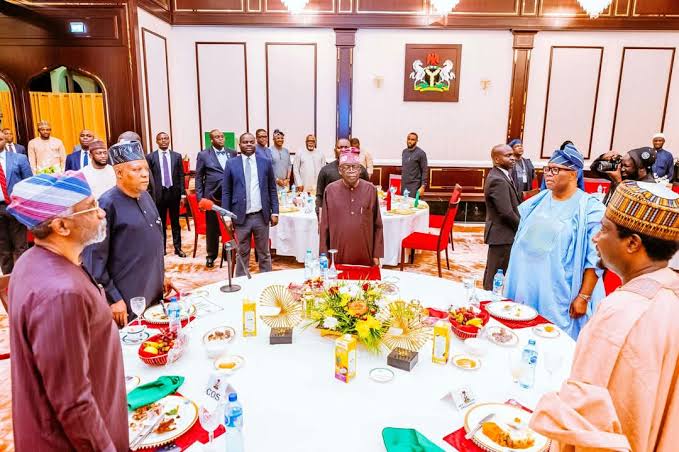
State governors are ramping up their efforts to block the federal government from directly distributing funds to local government councils. This initiative seeks to postpone the implementation of the Supreme Court decision that grants financial independence to local government areas (LGAs).
In a recent gathering with President Bola Tinubu at the State House in Abuja, several governors voiced their opposition to the direct transfer of local government funds via the Central Bank of Nigeria (CBN). They contended that local governments are burdened with significant debts that require immediate resolution.
Sources from the presidency revealed that the governors took advantage of the Iftar dinner to urge Tinubu to reconsider the direct funding of LGAs, a process that has already encountered numerous obstacles.
“When the governors attended the Iftar on Monday, they requested a meeting with the President, which occurred on Tuesday afternoon. Some engaged in extensive discussions with him and departed only after 6 PM,” an insider disclosed.
Another official, who spoke on the condition of anonymity, confirmed that the meeting was focused on achieving a favorable outcome. “The federal government intends for local government allocations to be deposited into CBN accounts, necessitating that each LGA establish an account with the central bank. However, the governors are against this, arguing that this arrangement keeps the funds under federal oversight,” the source clarified.
The governors advocate for the funds to be placed in commercial bank accounts, believing this would grant them more autonomy. One governor reportedly raised concerns that requiring approval from the Accountant-General would still allow the federal government to maintain financial control. Nevertheless, the presidency has rejected this proposal.
After the meeting, an official noted that discussions were still in progress, but the withheld local government (LG) allocations continued to be a significant source of disagreement.
The issue of financial independence for local governments has been a persistent challenge, often complicated by state control over financial resources. On July 11, 2024, the Supreme Court issued a pivotal ruling, stating that federal funds must be deposited directly into LG accounts instead of being funneled through state governments.
This decision came in response to a lawsuit from the federal government aimed at enforcing constitutional rights related to LG autonomy. The Supreme Court ruled that the practice of state governments managing LG funds was unconstitutional and ordered an immediate transition to direct funding.
Additionally, the court clarified that only democratically elected LG officials are permitted to oversee these funds, rendering caretaker committees or appointed administrators invalid. This measure is intended to limit the influence of state governors over local government finances.
To adhere to the Supreme Court’s ruling, the Central Bank of Nigeria (CBN) directed all local government areas (LGAs) to provide two years of audited financial statements before they could access funds. The central bank also began the process of establishing dedicated accounts for all 774 local governments to enable direct payments.
In February 2025, the CBN revealed that it had started profiling LG chairpersons and authorized signatories to enhance transparency and accountability. However, pushback from state governors has hindered the implementation of these measures.
The National Union of Local Government Employees has cautioned the CBN against allowing governors to impede financial autonomy. Reports suggest that some LGAs faced difficulties in opening accounts due to claims of non-compliance with auditing requirements. Meanwhile, the Association of Local Governments of Nigeria (ALGON) has indicated that it has not received any official updates from the CBN on this issue.
Nine months following the Supreme Court’s decision, the direct payment to Local Government Areas (LGAs) is still hindered by logistical and political challenges.
On March 2, 2025, it was reported that Oluwatoyin Madein, the former Accountant-General of the Federation, and Lateef Fagbemi, SAN, the Attorney-General and Minister of Justice, had begun talks aimed at implementing the ruling. These discussions centered on gathering verified bank account information for democratically elected LGAs. However, the task of identifying legitimate local government officials has proven difficult.
Minutes from the Federation Account Allocation Committee Technical Sub-Committee indicate that the process is still not finalized.
In spite of rising tensions, President Tinubu has reiterated that his administration is not in conflict with state governors regarding local government autonomy.
“There have been rumors of disputes over local government autonomy, but that is not accurate. We require cooperation,” Tinubu stated during a New Year visit from Vice President Kashim Shettima and members of the Nigeria Governors Forum at his residence in Ikoyi, Lagos.
He called on state governors to support local government reforms to foster grassroots development. “No one is taking local governments away from you. You have control over them, but we must ensure effective service delivery at the grassroots level,” Tinubu emphasized.
Recent reports indicate that state governors are advocating for further delays in the implementation of direct allocations to LGAs. Some argue that LGAs have accrued substantial debts under their leadership, complicating the shift to financial independence.
Mohammed Abubakar, Secretary-General of the Association of Local Governments of Nigeria (ALGON), confirmed that the Central Bank of Nigeria (CBN) is facing challenges in enforcing the court’s ruling. He suggested that governors are exerting pressure on the central bank to postpone direct payments due to the significant liabilities associated with LGAs.
As negotiations progress, the future of financial autonomy for local governments remains unclear, with a power struggle ongoing between governors, the federal government, and the CBN over control of grassroots funding.



